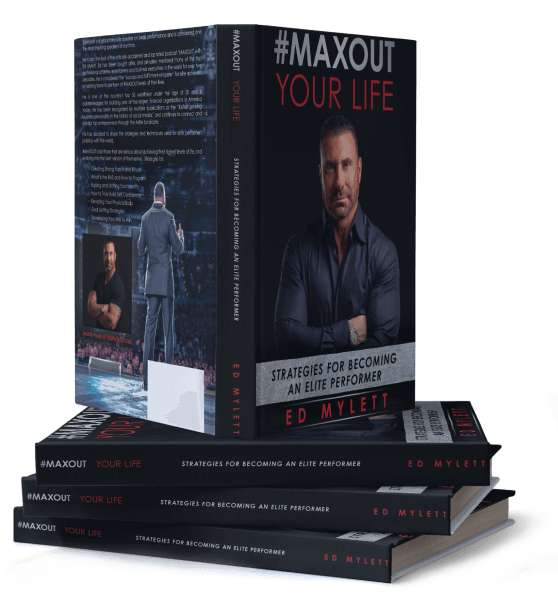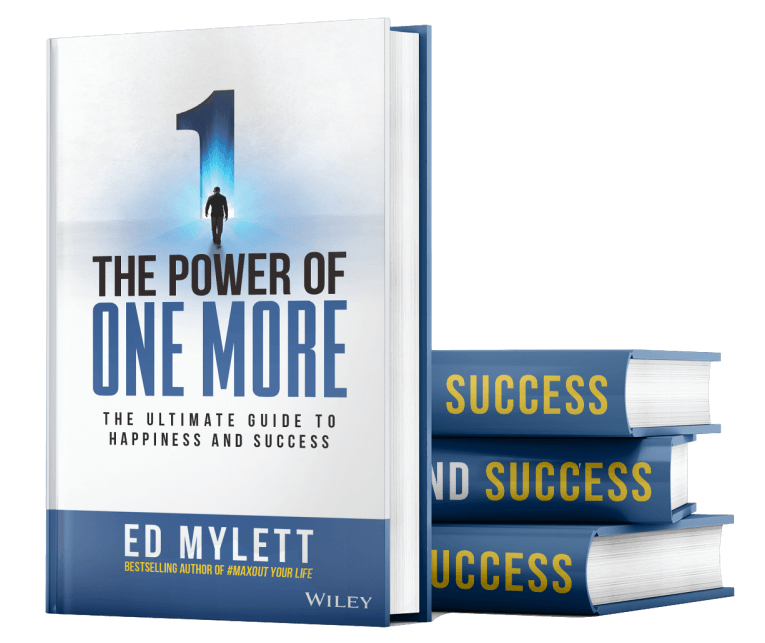Have you ever struggled with motivating yourself to #MAXOUT your life? The secret to motivating yourself is actually already inside of you. Your body releases chemicals that drive you to be more productive, and these chemicals also give you the energy to do AMAZING things. Today I'm happy to bring you someone who knows all about your body's chemicals: Dr. Andrew Huberman. Dr. Andrew is an expert on the nervous system and the neurotransmitters that directly affect every part of your body. Dr. Andrew's advice is very digestible and practical. Even though he uses many technical terms, he always brings it back around so that you can apply the scientific principles to your own life! This episode will show you how to harness your body's chemicals so that you can get on the path to #MAXOUT your life and feel great while doing it!
Who Is Dr. Andrew Huberman?
Dr. Andrew is the head of Huberman Lab in the Department of Neurobiology at Stanford University. He's received numerous awards and recognitions for his research and publications, including the McKnight Foundation Neuroscience Scholar Award, the Biomedical Scholar Award from the Pew Charitable Trusts, and the Cogan Award for Research in Vision and Ophthalmology. In addition to being a tenured professor of neurobiology and ophthalmology at Stanford University, Dr. Andrew is a BRILLIANT neuroscientist, and he excellently explains complicated concepts in a way that everyday people can understand them and use neuroscience to improve their lives. So what exactly does a neuroscientist study?
"A neuroscientist wants to understand how the nervous system works [and] what it does, and that really encompasses everything. So memory, experience, perception, states of mind — like fear or stress or sleep … A neuroscientist is sort of a catchall for somebody that's interested in understanding how nerve cells [i.e.] neurons, and some of the other cells in the nervous system, how those work together to control all the functions of the brain and body. … And we also want to understand how that actually impacts what everyday people would think of as depression or happiness or motivation or drive." - Dr. Andrew Huberman
Dr. Andrew's field of expertise in neuroscience primarily focuses on vision and states of mind. The "vision" aspect of his work involves the literal act of seeing, and his studies on humans’ states of mind involve finding humans' peak performance states. His immense knowledge of the nervous system offers many practical tools to grow and #MAXOUT your life. I’m incredibly pumped for you to learn from Dr. Andrew today, so let’s dive in!
The Power of Dopamine
In our interview, Dr. Andrew talked all about the chemical driving us towards our goals and MAXING OUT our lives: Dopamine.
"Dopamine is released anytime we experience something we really like, but under very specific conditions. Anytime we are moving towards something, and we think we're on the right path, dopamine is released. And this is nature's way of telling whatever neurons are active during that movement down that path. So this could be exercise. It could be a relationship breakthrough. … It could be learning some little piece of a puzzle that you're excited to learn." - Dr. Andrew Huberman
Contrary to popular belief, dopamine is not released when you get a reward but released when you recognize that you're on the right path to get a reward. Dopamine shapes your brain so that when released, you naturally want to continue down that path:
"Dopamine naturally causes neuroplasticity of whatever brain circuits were active previously. So it says, 'Hey, whatever I did to get to this point, this milestone, not the finish line, that is something that I might want to repeat reflexively in the future.'" - Dr. Andrew Huberman
This is such an awesome thing to understand because the pleasure you get from dopamine is obtained NOT by accomplishing your goals but by striving towards them. It doesn't matter if you don't fully accomplish what you were striving towards — you're STILL going to get that pleasure from dopamine if you just try. It doesn't matter if you finish first or last in a sporting event or if you do or don't get that promotion you were competing for. As long as you are working towards your goal, your body is going to release dopamine, and dopamine is a chemical often associated with your overall well being and happiness. You don't have to get everything that you want in life to be happy — you just need to PURSUE growth. Dopamine also instills more energy in you so that you continue working towards your goals and hopefully complete them:
"The great thing about dopamine is [that] it rewards us, and it gives us energy … I mean neural energy. And the reason is effort of all kinds … is generally associated with the neuromodulator adrenaline, also called epinephrine. … Adrenaline in the body is released from the adrenals, and then epinephrine in the brain is released from a couple of places, but there's one particular place. ... It's called the locus coeruleus. It's in the brainstem. It wakes us up. It gives us a sense of urgency, and it's about effort." - Dr. Andrew Huberman
Have you ever worked tirelessly on a project and felt that you were burning out but then discovered that you had made progress, and this gave you a sudden, unexpected burst of energy? That's the dopamine in your body doing its magic. You realized you were making progress on your path, so you received a burst of epinephrine that rewarded you with more energy.
The Importance of Tapping into Your Internal Reward System
Although you can use dopamine as a major tool for MAXING OUT your life, it can also be detrimental if you're getting dopamine through unhealthy habits:
"Occasionally, I pick up my phone, and I log into an app, and I didn't make the conscious decision to do it. I just do it reflexively. … And the reason is that the brain and the nervous system are constantly seeking rewards and novelty. And if we're not deliberate about how we're doing that, we will do it entirely reflexively." - Dr. Andrew Huberman
If you get in the habit of obtaining dopamine through actions that don't serve you, you'll find yourself on an unhelpful trajectory. Dr. Andrew's example of checking his phone is an extremely common problem. How often do you check your social media because you feel a burst of dopamine when you receive a notification? Getting dopamine through unproductive activities will cause you to develop unproductive habits. You need to make a conscious effort to engage in healthy activities that release chemicals related to neural energy:
"Effort is the first gate that you have to go through in order to build this pathway that involves norepinephrine or adrenaline and epinephrine." - Dr. Andrew Huberman
Another key to using dopamine healthily is to focus on your internal reward system rather than external rewards. The internal reward system is the dopamine that you get when you are making an effort, while the external reward is what you receive once you've completed the work.
"Be very careful with extrinsic rewards. Make sure that your dopamine system is attached more to the effort process than it ever is to any external reward. … It's what neuroscientists call 'dopamine reward prediction error.' Reward prediction error is the reason why people that work in pursuit of a goal, and then reach that goal become miserable and don't know what to do with themselves." - Dr. Andrew Huberman
Have you ever worked on a project where your primary motivation was seeing the final product or reward, but when you finished, you didn’t feel as good as you thought you would? You need to put your pleasure in the effort process rather than the completed project or external reward.
"Reward prediction error says you always need the dopamine at the final stage to exceed all the little bits of dopamine you got in route to that reward. You will actually be disappointed. You'll experience a sort of postpartum depression of sorts. So the key is [to] learn to attach reward to the effort process. … It's not about feeling good about some external milestone. It's about learning how to tap into this engine that we have." - Dr. Andrew Huberman
Dr. Andrew noted that the key to finding that internal engine that motivates you to keep going is developing a GROWTH MINDSET. Growth mindset is about the act of growing and not the external rewards that may come with growth:
"We need to think if we’re talking about the nervous system, and we want to make it actionable for high performance … we want to think in terms of processes. ... Reward as a verb. Not just as a, 'Oh, you're going to just pat yourself on the back.' Like no, it's what you internalize. It's a process. That's how the neural circuits that underlie reward get stronger. And the beauty of the brain is that you have this thing of neuroplasticity, which is its ability to change itself throughout the whole lifespan. And the more you practice this, the better you get at it … It means … you have the energy to continue to push forward." - Dr. Andrew Huberman
You shape your brain through repeated actions, so the more you internalize the pleasure in your efforts, the easier it will become to derive pleasure from your internal reward system that motivates you to #MAXOUT. If you shift into finding pleasure in the effort over the external reward, you’re going to have more of a drive to continue pushing yourself.
Using Your Discomfort to #MAXOUT Your Performance
Do you want to be a WINNER, but you're unsure how to start? Dr. Andrew cited fascinating research on the subject that will CHANGE your life. He noted a famous experiment involving two mice. The two mice go into a tube and fight over sole ownership of the tube. Inevitably, one mouse pushes the other mouse out of the tube. The winner mouse will continue winning subsequent tube fights against other mice while the loser mouse will continue losing against other mice. A recent experiment monitored the brain activity of the two mice while they fought:
"They found that there was one brain area. It's a subregion of the prefrontal cortex … that's more active in the winner and less active in the loser. So much so that if you chemically or electrically activate this brain area in the loser, that loser then becomes the winner. If you quiet this brain area in … an animal that's about to win, then it suddenly becomes the loser. … It turns out that stimulation of this brain area that causes winning is associated with increased anxiety, effort, and adrenaline. And all it does is it converts that anxiety into more steps forward per unit time." - Dr. Andrew Huberman
Increased anxiety was the distinguishing factor for the winner mouse. The winner mouse's anxiety directly influenced its ability to move forward and push the other mouse out of the tube. Dr. Andrew observed that the mice experiment offers an essential takeaway for handling anxiety and discomfort:
"You always have only three options. You can either be stationary, … you can retreat, or you can go forward. … Anxiety and stress, and what we call 'autonomic arousal' were designed to move us. They create a sense of agitation and discomfort for a reason, but it wasn't just designed to move us to run and hide. It was also designed to move us forward." - Dr. Andrew Huberman
Rather than combating your anxiety and discomfort, you can harness it to push yourself forward. You can use your discomfort to motivate you to improve every area of your life, including your career, fitness, and relationships. You're designed to experience a degree of discomfort so that you move forward. If we’re comfortable all the time, we don’t grow. Dr. Andrew observed the common problem of trying to calm the discomfort rather than using it:
"There's just so much in our culture that's about trying to get homeostasis … and trying to get back to this place of calm or flow ... and what they don't appreciate … is that all forms of adaptive behavior in the animal kingdom and in humans, whether or not it's with the mind or the body or both, involve a fairly high level of stress and anxiety that was designed to move us forward." - Dr. Andrew Huberman
Dr. Andrew raises a fascinating point. Humans are supposed to experience a degree of discomfort to push forward, so if you're avoiding the discomfort rather than using it to #MAXOUT, you're not going to grow. You have to get out of your comfort zone to improve your life!
#MAXOUT with Dr. Andrew Huberman
Guys, Dr. Andrew Huberman and I discussed so many different helpful ways to improve your life. You're doing yourself a serious disservice if you don't check out this full episode. Dr. Andrew was an absolutely incredible guest, and his research-based methods of MAXING OUT your brain chemistry will completely change your life. I also encourage you to follow Dr. Andrew on Instagram, where he posts fascinating and usable information about neuroscience! As I said before, he explains it all in a simple, effective way that everyone can understand! If you loved this conversation as much as I did, share it on Instagram! Connect with Dr. Andrew, @hubermanlab, and with me ,@Edmylett, and use the hashtag #MAXOUT to share information from the episode that you found to be the most helpful! Also, make sure to check out my two-minute drill! I make a post every day at 7:30 P.M. Pacific Time, and those of you who comment within two minutes of that post will have a chance to win a variety of awesome prizes, including a coaching session, #MAXOUT gear, and a copy of my book. Guys, your body is full of chemicals that reward you for your efforts. Tap into that internal reward system and feel great while you strive to #MAXOUT! It's not about what you accomplish — it's about PUSHING yourself forward! Put in the effort, and #MAXOUT your life!
WORK WITH ED












